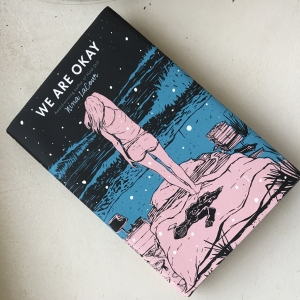
One of the biggest struggles of looking for a book with LGBTQ+ representation is finding books that place outside of the romance genre, the topic of coming out, or the subject of transitioning. There are very few books out in the world that showcase the LGBTQ+ community simply existing and dealing with everyday struggles. However, We Are Okay by Nina LaCour, does just that as she tells the story of Marin, a grieving freshman college student, who happens to be a lesbian.
After the death of her grandfather, the only remaining member of her family, Marin slips away from the life she knows and into her new life at college, determined to forget her old life and create a new home in her dorm. Until now, she’s kept her distance from her old friends from San Francisco. While she hunkers down in her dorm room for winter break, Marin is visited by her old friend Mabel, which forces both of them to face the mess Marin ran away from.
This novel beautifully explores how grief impacts people and their relationships with one another through two main plot lines: the story of Marin and Mabel, mostly told through the present, stream of consciousness narrative, and the story of Marin and her Grandfather, told through vignettes. All of this is done in a first person perspective, using gorgeous imagery that does not sacrifice clarity of the narrative, save for the details that are hidden through Marin’s own denial.
While there isn’t a lot that actively happens in the novel, the heart of the story lives in the tension between the characters. Marin and Mabel may spend most of the novel eating and sleeping and avoiding real conversation, but Marin’s narration and the anxieties she has as the two of them cook spaghetti or got lost in a snow storm distract from the lack of action. This allows for the themes of the novel (death, grief, and trust) to be fully explored. We Are Okay is a character study, a fictional narrative meant to explore Marin and her grandfather’s traumatic experiences with death in depth.
Despite the fact that We Are Okay strongly focuses on the grieving process, it is not a hopeless or altogether depressing read. This isn’t to say I didn’t cry— I definitely cried at least twice. The hopefulness in We Are Okay comes from Mabel’s presence, calling back to Marin’s recovery. Mabel again and again presses Marin to confront the death and lies of her grandfather with the underlying idea that talking about these issues will allow Marin to move on into another stage of life and cope with a support system. The novel does not push Marin to a place where she is unsafe, but allows her to grow to a place where she finally believes she will be okay some day. We Are Okay does not offer quick fixes, but it does give hope of recovery within a topic that is so often used for simple drama and tragedy.
Part of the reason LaCour succeeds in her discussion of grief is the simple narrative she places it in and the casual nature with which she approaches the subject. She also addresses the characters sexualities in the same way; she never directly labels Marin as gay or Mabel as bisexual, but she makes it clear through their dialogue and the memory their past romantic relationship.
There is a minor conflict that comes with the level of casualness that LaCour uses, particularly in Mabel’s case. Within the bisexual community, many people take issue with the lack of naming bisexual characters as bisexual because in some ways, it’s a form of bi-erasure. On the other hand, LaCour never disqualifies that Mabel has feelings for both gender. Additionally, LaCour is known within the YA community for writing about sapphic women in her works, writing to give the representation that she didn’t see for herself. The casual nature of the representation in both Mabel and Marin’s case at the very least allows for the focus of the narrative to be about grief, allowing We Are Okay to be a story about two sad girls who happen to be gay and bisexual, as opposed to a narrative focused on two girls being sad, gay and bisexual.
We Are Okay graced “top YA releases” lists for 2017 across the internet, praised by those who’ve never read YA and those who only read YA. There are many reasons for this, including the absolutely beautiful prose, the slowburn storytelling that contrasts the surprisingly fast pace, and the subtle representation of sapphic women. However, the main reason is the representation of grief in all of its different forms, even those that are complex and far from cut and dry. If you’re looking for a good representation of sapphic characters, an emotionally engaging story, or an excuse to cry, look no further than We Are Okay.
KATIE MONTHIE
